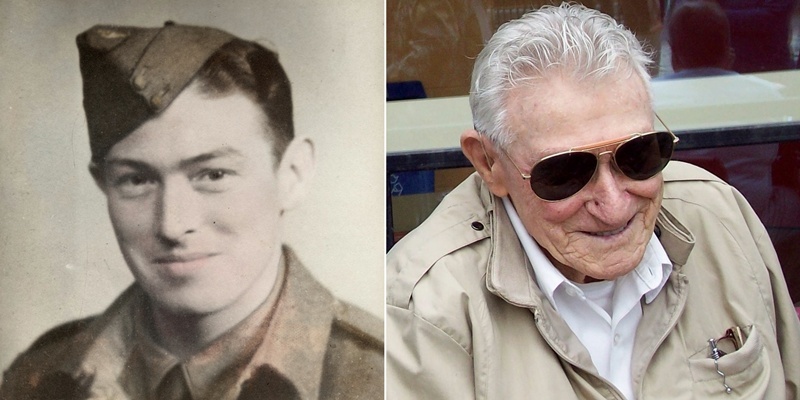A former Dundee man whose experience as a prisoner of war led to him being a witness at a war crimes trial has died in Canada at the age of 92.
John Hardie, known as Jack, was with the 51st Highland Division when they surrendered at St Valery on the Normandy coast of France.
They were formed from The Black Watch, the Seaforth Highlanders, the Queen’s Own Cameron Highlanders and the Argyll and Sutherland Highlanders, and were part of the British Expeditionary Force.
The 51st were charged with recapturing the Abbeville bridgehead on the Somme while the bulk of the expeditionary force were evacuated, but they were driven back and withdrew to St Valery. There they were outnumbered and bombarded by Rommel’s 7th Panzer Division and surrendered to the Germans on June 12, 1940.
Those captured included a 19-year-old Mr Hardie. His daughter Margaret said from her home in Canada, “My father was a prisoner of war until he was rescued by the Americans.
“During his time as a prisoner he witnessed some atrocities, including the murder of a fellow soldier John Abear, who was shot in the back by a German guard.
“My father reported this to the authorities after his return to England, and in 1946 he travelled to the war crimes trial held at Buckeburg in Germany to testify.”
Christened John Kelly Hardie, he was born in a cottage in Stobswell Road in Dundee, and attended Stobswell School with his cousin Bette Hay, nee Hardie.
Mr Hardie spent his early years by the docks running errands for sailors to help contribute to the family income. He left school at 14 to work in a jute mill, and later found employment as a lumberjack and a baker.
When the Second World War broke out in 1939 he joined the army and was sent to Winchester for training. He was among the troops sent overseas and saw action as part of the 51st Highland Division, under the fateful command of Major General V. M. Fortune.
After the war Mr Hardie was assigned to the Princess Louise Kensington Regiment, 6th Battalion. He returned to Dundee and finished his service driving trucks from the coast to an army base at Chilwell, near Nottingham.
His discharge papers hailed Mr Hardie’s exemplary military conduct and described him as “willing, hardworking, honest and trustworthy.”
On demob he worked as a bus conductor in Stapleford near Nottingham, where he met and married Joyce Tildsley. They had three children, Sheila, Margaret, and Andrew, and lived in England until 1957, when they emigrated to Canada at the same time as his cousin Bette.
Both families settled in St Catharines, Ontario, where Mr Hardie bought a truck and made a living hauling construction materials to building sites, retiring at the age of 61.
Margaret said, “The years that followed saw my parents travelling throughout the Americas and many of the Caribbean islands. Many winters were passed in Chapala, Mexico.”
She added, “He also loved his backyard and spent many happy summers laying out different patterns for the garden, lawn and various outbuildings.”
Hockey, music and reading were Mr Hardie’s main interests, and he spent hours in libraries. Education was important to him as he could not complete his own schooling, and he was largely self-taught.
Margaret said her father had come a long way.
She said, “His journey in this life is over now. He was born in a little cottage with a dirt floor in Dundee, Scotland, and finished it after many happy years in a comfortable home in St Catharines.”
As well as his wife, two daughters and son, he is survived by eight grandchildren, 11 great-grandchildren and one great-great-grandchild. His cousin Bette still lives in St Catharines.
